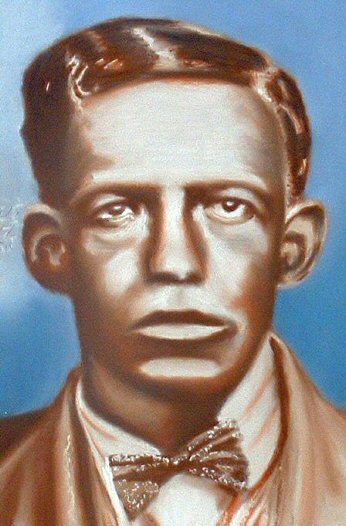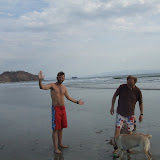Here's a fingerpicking blues by Mississippi John Hurt....Nobody's Dirty Business (played on my new 1940 Hensel Artist Grand Concert guitar). Hope you like it....
An Expat Life: Nicaragua Blues and Ruse
Thursday, May 24, 2007
Tuesday, May 22, 2007
Nicaraguan Soccer
Here's a little footage of Brodie and Mateo demonstrating the finer points of the grand ole game of futbol. I especially like the calisthenics.....
Monday, May 21, 2007
Monday Morning Blues #8

Well...the rain fell down here in Managua. The rainy season has officially begun. What better 'rainy day' music to listen to than the blues. Luckily for me, I have a few selections to choose from. Since the downpours are often violent, and flooding occurs, there is no other choice but to listen to the great Delta bluesman, Charley Patton, singing about the 'high water', the Mississippi flood of 1927, and hard living (plenty of that here in Nicaragua!).
Patton was one of the blues pioneers, a man that, along with Blind Lemon Jefferson and Leadbelly, became an inspiration to generations of bluesmen, and subsequent musicians in general. His hard-hitting style of slide guitar reverberates today as loudly as it did 80 years ago. Simply put, he was one of the first legends of the blues, a Delta 'star', if you will.
Born in Hinds county, Mississippi in 1891, Patton and his family soon moved to the famous Dockery Plantation, where Howlin' Wolf, John Lee Hooker, and Robert Johnson later followed in his footsteps. He, along with Son House, Tommy Johnson, and others, more or less created the Delta blues buzz of the early 20th century. Playing behind his head, between his knees, with a loud, gravelly voice, Patton blazed a distinct trail for future bluesmen. Although small in stature, Patton is a giant in the genre.
I could elaborate further, but I feel that famed cartoonist R.Crumb sums it up best, describing Patton's eclectic life in a comic book style motif seen here. Patton lived the typical 'bluesman' life, drinking heavily, chasing women, entertaining crowds on Saturday night, and eeking by the rest of the week. Hard times, hard livin'...
For the best of the hard driving Delta blues, and insight into the Delta region in the early 20th century, check out the extensive box set, Screamin' & Hollerin' the Blues. (available for a limited time here) Patton truly was the 'Father of the Delta Blues'. After listening, you may find yourself thirsty for some of that good ole bootleg whiskey....then, you'll hear the crickets chirping, hoot owl singing, and the jubilation and misery of the Delta from a faraway time.
Sunday, May 20, 2007
Sunday Morning Bob
Well....I want to share some profound video of folkie Bob taken from the Steve Allen show in February 1964, a truly inspiring icon of 20th (21st as well) century America. The first clip is an interview by the legendary Steve Allen, while the second is the classic story of class and racial struggle in contemporary (at the time)America, The Lonesome Death of Hattie Carroll, gleaned from newspaper accounts by the prolific songwriter. Incidentally, the antagonist of the song, William Zantzinger, currently lives in Maryland, after serving several prison sentences.....Enjoy!!
The interview
The Lonesome Death of Hattie Carroll
This song, with its unique phrasing and topical content, along with his other 'finger-pointin' songs', helped revolutionize the way modern American music was made.
The interview
The Lonesome Death of Hattie Carroll
This song, with its unique phrasing and topical content, along with his other 'finger-pointin' songs', helped revolutionize the way modern American music was made.
Friday, May 18, 2007
Celebrate the Masters....
I think the videos speak for themselves....
Furry Lewis and Bukka White at a party in Memphis in the late 1960s
Furry Lewis and Bukka White at a party in Memphis in the late 1960s
Monday, May 14, 2007
Monday Morning Blues.....It's Morning Somewhere

Well, this is a little late for Monday Morning Blues, but late is better than never....This week, I'm exploring the sound that came out of 'my neck of the woods', ......East Coast Blues 1927-1933. East Coast Blues, or the Piedmont Blues, was just as important as its more famous musical cousin, the Delta Blues, but remains on the periphery of mainstream acceptance as a shaping force of the American musical lexicon. In contrast to the hard-hitting monotonic tales of woe and misery on the Mississippi Delta, the Piedmont sound, at least musically speaking, tells a much happier tale. This is piano music.....'Raggin' the Blues'. One of the most prolific, if not most talented, bluesmen (Blind Gary Davis) of the early 20th century once mused that he'd play piano, but he couldn't carry one on his back....
So, you may have heard of some of the more famous bluesmen of this geographical and musical arena....in addition to Blind Gary Davis, there was Blind Willie McTell, Blind Blake, and Blind Boy Fuller (alas...they weren't all blind I promise!). All four had extensive catalogs, were well chronicled, and much revered, on a layer of notoriety just a tad beneath the more famous Delta musicians, such as Son House and Robert Johnson. All one needs to do is listen to Davis or McTell a couple of times, before you start wondering what else there is out there that might be lurking underneath the surface. 'East Coast Blues 1927-1933' explores some of the less obscure artists that 'rag the blues' with their Stella guitars, zoot suits, and bootleg whiskey.
Getting back to Blind Gary Davis, a man that experienced the 1920s Race Record boom, the subsequent Great Depression, and the Blues Revival of the 1960s, becoming a bridge, of sorts, to burgeoning musicians....an inspiration and musical guide. He was once asked who he thought was the best bluesman he knew of, to which he replied without hesitation.....Willie Walker. Walker, blind at birth, died at only 37 years of age in 1933, was only rediscovered in the 1970s, yet still remains obscure to the modern listener. Here, we're treated to 2 of the 4 sides the Greenville, South Carolina native recorded for Columbia Records in 1930, 'South Carolina Rag' and 'Dupree Blues'. Davis knew what he was talking about. As I listen to the former, I openly wonder how many unknown legends there are/were.......Life's a mystery I say....
Additionally, there is Bo Weavil Jackson's 'Pistol Blues', a musical hybrid of the more popular 'Crow Jane', and Chicken Wilson & Skeeter Hinton playing a rollicking 'Myrtle Avenue Stomp', complete with washboard, spoons, and a rapid delivery guitar style that makes you want to do a jig right in front of your computer. William Moore shows up on several tracks, none better than the fitting 'Raggin' The Blues', where he captures the essence of a bygone era of bathtub gin and the cultural transformation of urban America.
If you think the Blues is only about the sound of Robert Johnson, Son House, and the Delta.....or it is best found in the Blues bars of Chicago and the feathered cap of Stevie Ray Vaughan, please do yourself a favor and pick up some Piedmont Blues. Alas, in Martin Scorcese's much heralded Blues documentary, he lists a map showing 'significant' blues regions and makes no mention of the Piedmont region!!!!! Personally, I think there's more soul and expression in the 'D.C. Rag' kazoo solo by Chicken Wilson & Skeeter Hinton than on all of the electric blues found today. Don't take it from me though, go out and listen to some Blind Willie McTell and Gary Davis, and you too, will soon be clamoring to find out about these more obscure masters on collections such as this one.
Thursday, May 10, 2007
Monday, May 7, 2007
Monday Morning Blues Returns

Well....this was a rough weekend...I've had a fever, I ache all over, and have a piercing headache. What better circumstances to write about some blues! First off, I'd like to refer you to a nice website that I found, a vast reservoir of Blues, Ragtime, Country, Carribean, and Western Swing music of yesteryear.....Impressive!
I digress....Today, I'd like to discuss the great Huddie Ledbetter, better known as Leadbelly. Some of you already know about Leadbelly, and others still, know how much I admire the man and his music. At any rate, I'm going to discuss him in a little more detail today, offering some listening suggestions and observations.
Huddie Ledbetter was born in the backwater border area between Louisiana and Texas and emerged to become one of the true icons of American music, penning classics such as Goodnight Irene, Midnight Special, and many others. His songs were a reflection of America. He sang topical songs, about Boll Weevils, the Titanic, racism in Washington D.C., Hitler. He sang children's songs, work songs, union songs. You name it, Leadbelly had a song for it.
He was equally known for his booming voice and distinct 12-string guitar, which he named 'Stella' (named after the guitar manufacturer of parlor guitars, made famous by many bluesmen of the early 20th century). Tuned down to a much lower pitch, 'Stella' rung out and, coupled with his loud tenor voice, he produced a sound that pre-dated microphones. Whether it was at a 'sukey jumps', children's show, union rally, or in the fields, Leadbelly had a repertoire for all.
Using a plastic thumbpick and metal fingerpick, he played tunes for Alan Lomax's recording device (essentially the first portable recording device) and traveled the country as sort of a sideshow from a bygone era of minstrels and slave ships. Popular artists, such as Kurt Cobain and Bob Dylan, have been inspired greatly by Leadbelly. It was said that the former cited his 'Last Sessions' as his biggest musical inspiration. (Cobain had great taste by the way!)
A twice convicted murderer, Leadbelly famously sang his way out of prison, after recording a song for Louisiana Governor Pat Neff. Living under aliases and always seemingly in trouble with the law, Leadbelly amazingly escaped the incarceration and Jim Crow, to perform into his twilight years, linking himself with the left-wing establishment, along with Woody Guthrie, Sonny Terry, Brownie McGhee, Cisco Houston, and others. In a twist of fate, Leadbelly never lived to see his star shine on a wide-scale level, as his signature hit, Goodnight Irene, reached the top of the American charts, performed by Pete Seeger and the Weavers, mere months after he succumbed to Lou Gehrig's disease in 1949.
Every American song you hear on the radio has a little bit of Leadbelly in it. I suggest you check out Where Did You Sleep Last Night? as an introductory course into the man's music. Afterwards, you will be mystified and fascinated enough to delve into the rest. I guarantee....
Labels:
Country Blues,
Guitar,
Leadbelly,
Monday Morning Blues
Friday, May 4, 2007
Buckets of Rain
Here's one of my favorite Bob Dylan songs, played in open E.
Buckets of rain
Buckets of tears
Got all them buckets comin' out of my ears.
Buckets of moonbeams in my hand,
I got all the love, honey baby,
You can stand.
I been meek
And hard like an oak
I seen pretty people disappear like smoke.
Friends will arrive, friends will disappear,
If you want me, honey baby,
I'll be here.
Like your smile
And your fingertips
Like the way that you move your lips.
I like the cool way you look at me,
Everything about you is bringing me
Misery.
Little red wagon
Little red bike
I ain't no monkey but I know what I like.
I like the way you love me strong and slow,
I'm takin' you with me, honey baby,
When I go.
Life is sad
Life is a bust
All ya can do is do what you must.
You do what you must do and ya do it well,
I'll do it for you, honey baby,
Can't you tell?
Copyright © 1974 Ram's Horn Music
Wednesday, May 2, 2007
Playa Coco

Well.....we just returned from Playa Coco (see photos on the right). What a spectacular place to visit. In contrast to the choked traffic and din of Managua, Playa Coco offers peace, solitude, and extremely big waves. If you come to Nicaragua, find a way to get a 4x4 vehicle, and explore some of the most pristine beach areas that you could hope for.
About 3 hours by car, this little slice of paradise transformed my idea of Nicaragua. As there are approximately a dozen or so residences available for rent on a daily basis, selection is a bit limited. That said, we didn't go there to sit in a house. The main attraction is an unspoiled beach, 10 foot waves, cool, clear water, and absolute peace and solitude. It is just like the Corona commercials.
Okay, enough already with the sales pitch......Of significance, we took Stella for her first big excursion with the family. All said, she did great. She played with Chocolate, a little poodle owned by our Spanish friends...and even found two other yellow labs to bother. Anyways, what a way for us to celebrate the May Day holiday in Nicaragua......American and Spanish Imperialists, relaxing like true bourgeoisie, while Daniel Ortega rallies his Bolivian, Venezuelan, Haitian, and Cuban 'brothers' to unite on this important occasion. Thanks Daniel......your beaches afforded us the opportunity to recharge our batteries, as hegemony takes time and energy.... Refreshed and energized, we can now return to the task at hand.
Enjoy the photos.
Subscribe to:
Posts (Atom)




